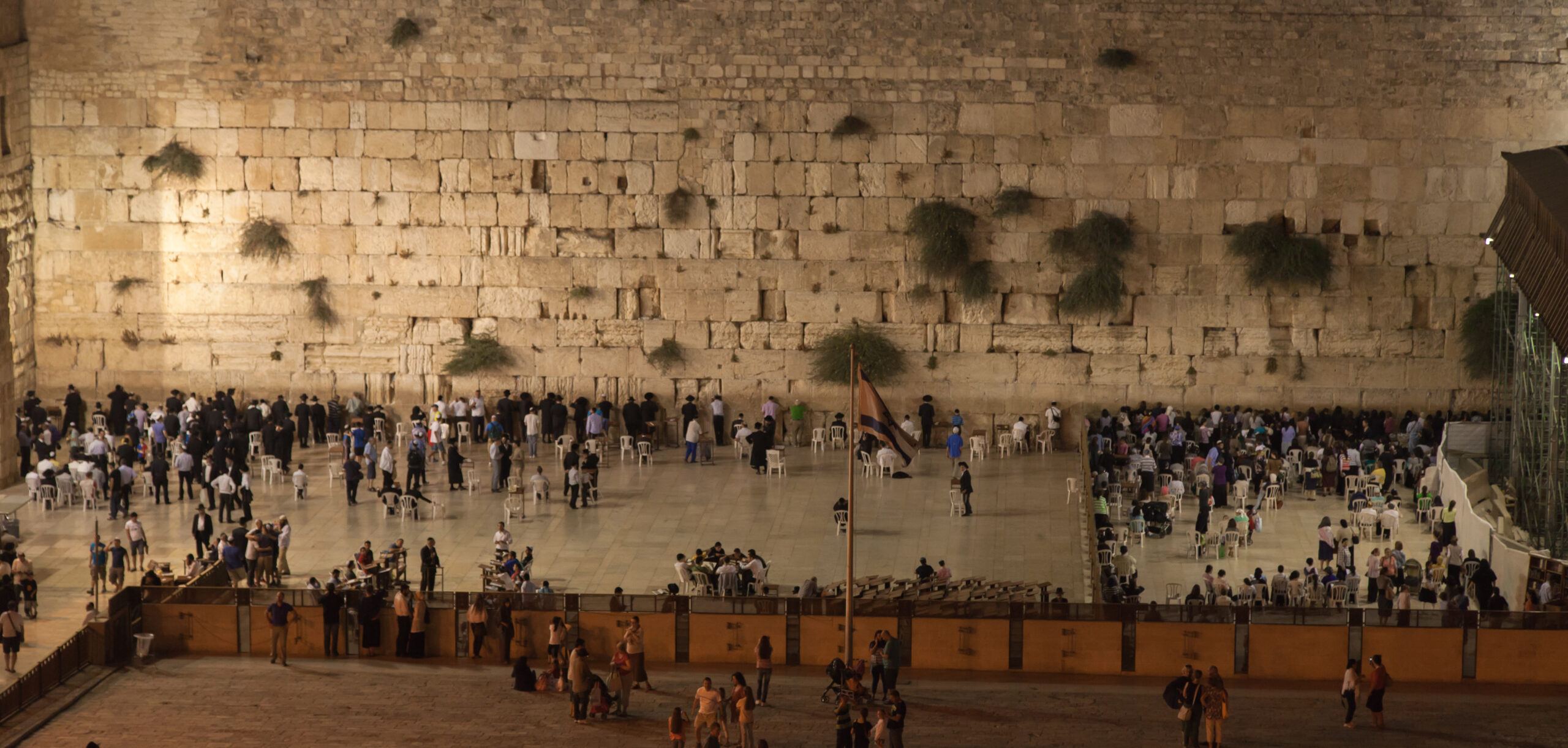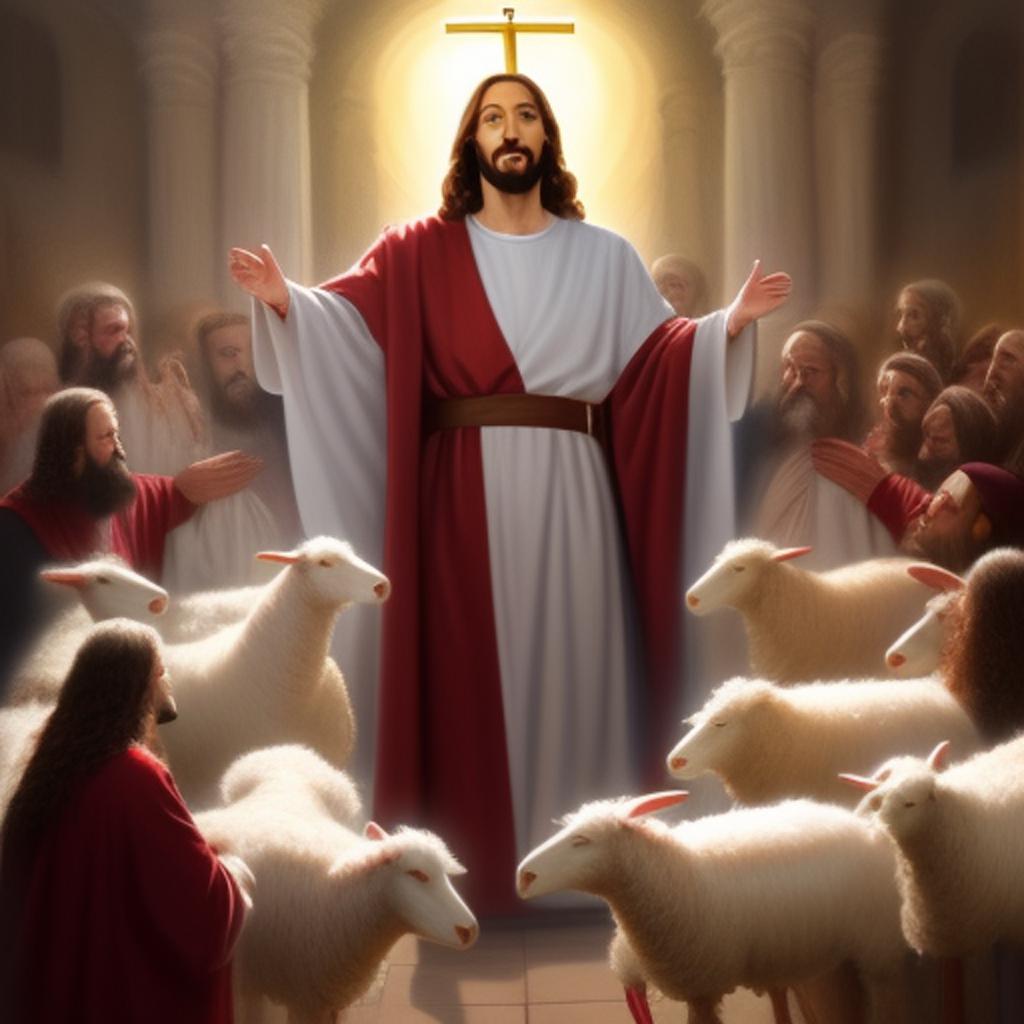Psalm 33: The Melody of Divine Creation and Messianic Anticipation
Psalm 33 Overview
Psalm 33 is a poetic composition found in the Book of Psalms. It consists of 22 verses, each reflecting on the greatness of God’s works and the importance of praise.The psalm is written in praise of Yahweh, emphasizing His power, faithfulness, and role as the creator of the universe. It is classified as a hymn and is attributed to King David.
Psalm 33 is a beautiful expression of praise and worship towards God. It begins with a call to rejoice in the Lord and sing praises to Him with musical instruments. The psalmist declares that it is fitting and upright for the righteous to praise God and make music to Him. The psalmist then proceeds to describe God’s greatness and power, emphasizing His role as the creator of the heavens and the earth. The psalmist exclaims, “By the word of the Lord the heavens were made, their starry host by the breath of his mouth”. This verse highlights the power of God’s word in bringing forth creation. Just as God spoke, and creation came into existence, the psalmist encourages the readers to trust in the power and faithfulness of God.
The psalmist further reflects on God’s sovereignty and His ability to frustrate the plans of the nations and bring about His purposes. The psalmist asks, “What the Lord has planned will stand, what he has purposed, he will do”. This verse reassures the readers that God’s plans and purposes are unshakeable and will ultimately prevail. The psalmist also emphasizes the importance of God’s unfailing love and faithfulness, stating, “The Lord loves righteousness and justice; the earth is full of his unfailing love”. This verse highlights the character of God, who is righteous and just, and whose love is never-ending.
Additionally, the psalmist recognizes the role of God’s creation in praising Him. The psalmist declares, “Let all the earth fear the Lord; let all the people of the world revere him. For he spoke, and it came to be; he commanded, and it stood firm”. This verse conveys the psalmist’s awe at the power and authority of God’s word. The psalmist recognizes that all of creation is called to worship and praise God. The natural world, with its beauty and order, serves as constant reminders of God’s creative power and invites all people to join in praising Him.
Historical and Cultural Context
In conclusion, the fear of God is not a slavish fear, but a filial fear that is born out of reverence and awe for the greatness and goodness of God. It reflects the religious and cultural practices of ancient Israel, particularly their monotheistic beliefs and the importance of praising God. During this time, the Israelites worshipped Yahweh as their God and believed in His power and sovereignty. The psalmist’s words resonate with the religious practices of ancient Israel, where music and singing played a significant role in their worship. The use of musical instruments and singing in Psalm 33 reflects the importance of music in ancient Israelite culture.
The historical and cultural context of Psalm 33 provides insight into the psalmist’s mindset and the intended audience. The composition of the psalm during the reign of King David highlights the influence of the Davidic dynasty and its religious practices. King David himself was known for his musical abilities and his role in establishing worship in the tabernacle. The psalmist’s call for the use of musical instruments and singing aligns with the cultural practices of the time, emphasizing the importance of music in worship.
Furthermore, the psalmist incorporates elements of ancient Near Eastern poetic traditions in Psalm 33. The use of parallelism, where ideas are repeated or contrasted in successive lines, is a common feature of ancient Near Eastern poetry. This poetic device is seen throughout the psalm, adding to its lyrical and rhythmic quality. The psalmist’s choice of words and imagery also reflects the cultural context of ancient Israel. The references to creation and God’s power draw upon the ancient Near Eastern belief in the divine creator who brought order to the world.
Themes of Divine Creation
Psalm 33 highlights God’s role as the creator of the heavens and the earth. The psalmist acknowledges the power of God’s word in bringing forth creation, stating, “By the word of the Lord the heavens were made, their starry host by the breath of his mouth”. This verse emphasizes the creative power of God’s word and the role it played in bringing the universe into existence. The psalmist marvels at the beauty and order of the natural world and sees it as evidence of God’s wisdom and creativity.
The psalmist’s reflection on God’s creation inspires a sense of awe and wonder. The psalmist declares, “Let all the earth fear the Lord; let all the people of the world revere him. For he spoke, and it came to be; he commanded, and it stood firm”. This verse conveys the psalmist’s awe at the power and authority of God’s word. The psalmist recognizes that God’s word is powerful and effective, and that His commands are unchanging and reliable.
Furthermore, the psalmist acknowledges the role of God’s creation in praising Him. The psalmist declares, “Let all the earth fear the Lord; let all the people of the world revere him. For he spoke, and it came to be; he commanded, and it stood firm”. This verse highlights the psalmist’s belief that all of creation is called to worship and praise God. The natural world, with its beauty and order, serves as a constant reminder of God’s creative power and invites all people to join in praising Him.
The themes of divine creation in Psalm 33 resonate with believers across different religious traditions. The psalmist’s reflection on God’s creative power and the beauty of the natural world inspires awe and gratitude. It reminds believers of the greatness and wisdom of God, and encourages them to recognize His handiwork in the world around them.
Messianic Anticipation in Psalm 33
While Psalm 33 does not explicitly mention the Messiah, it reflects the anticipation of a future deliverer. The psalmist’s praise and trust in God’s faithfulness foreshadow the hope for a coming Messiah who will bring salvation to His people. The themes of righteousness, justice, and God’s covenant relationship with His people in the psalm align with Messianic expectations.
The psalmist emphasizes the importance of righteousness and justice in God’s character. The psalmist declares, “The Lord loves righteousness and justice; the earth is full of his unfailing love”. This verse highlights God’s commitment to righteousness and justice, which are central to His character. The psalmist’s emphasis on these qualities reflects the Messianic expectation of a future ruler who will establish righteousness and justice in the world.
Additionally, the psalmist acknowledges God’s covenant relationship with His people. The psalmist declares, “But the plans of the Lord stand firm forever, the purposes of his heart through all generations”. This verse highlights God’s faithfulness to His covenant promises and His commitment to His people throughout generations. The psalmist’s trust in God’s faithfulness foreshadows the hope for a coming Messiah who will fulfill God’s promises and bring salvation to His people.
The themes of messianic anticipation in Psalm 33 align with the broader Messianic expectations found throughout the Old Testament. The prophets foretold the coming of a future deliverer who would establish God’s kingdom and bring about the ultimate redemption and restoration. The themes of righteousness, justice, and covenant relationship with God found in Psalm 33 contribute to this Messianic hope and provide a foundation for understanding Jesus as the fulfillment of these prophecies.
An example of a Messianic psalm that shares similar themes with Psalm 33 is Psalm 2. Psalm 2 describes the nations conspiring against Yahweh and His Messiah. It speaks of a close relationship between the Father and the Son, Yahweh and His Messiah. Psalm 2 is quoted by Jesus to show that the Messiah is greater than David. Another example is Psalm 110, which describes the Messiah as both a Priest and King, being in the order of Melchizedek. Psalm 110 speaks of the Messiah subduing and judging the nations. These messianic psalms contribute to the understanding of Jesus as the fulfillment of Messianic prophecies and the hope for salvation.
Significance in Religious Traditions
Psalm 33 holds significant importance in Jewish and Christian religious traditions. It is often recited or sung during worship services and is valued for its expression of praise and trust in God. The psalm’s message of divine creation and messianic anticipation resonates with believers, inspiring them to worship and seek God’s guidance.
In Jewish tradition, Psalm 33 is recited during morning prayers on the second day of each month. It is also recited during the holiday of Shavuot, which commemorates the giving of the Torah at Mount Sinai. The psalm’s emphasis on God’s creative power and faithfulness is particularly relevant during this holiday, as it celebrates the revelation of God’s law to His people.
In Christian tradition, Psalm 33 is often sung or recited as part of worship services. The psalm’s message of praise and trust in God’s faithfulness resonates with believers, inspiring them to offer their worship and devotion to God. The psalm’s themes of divine creation and messianic anticipation also contribute to the understanding of Jesus as the fulfillment of Messianic prophecies and the hope for salvation.
The significance of Psalm 33 in religious traditions lies in its ability to inspire reverence, awe, and hope. The psalmist’s expression of praise and trust in God’s faithfulness resonates with believers, encouraging them to seek God’s guidance and worship Him with gratitude. The psalm’s message of divine creation and messianic anticipation connects believers to the broader narrative of God’s redemptive plan and instills a sense of hope for the future.
Interpretations and Reflections on Psalm 33
Scholars and theologians offer various interpretations of Psalm 33, highlighting its spiritual and theological significance. Some view the psalm as an expression of trust in God’s providence, while others see it as a call to praise and rejoice in His works. Reflecting on Psalm 33, believers find encouragement to trust in God’s sovereignty, seek righteousness, and anticipate the fulfillment of God’s promises.
One interpretation of Psalm 33 focuses on the psalmist’s trust in God’s providence. The psalmist declares, “The Lord foils the plans of the nations; he thwarts the purposes of the peoples. But the plans of the Lord stand firm forever, the purposes of his heart through all generations”. This verse emphasizes the psalmist’s confidence in God’s ability to frustrate the plans of the nations and bring about His purposes. Believers find encouragement in this verse to trust in God’s sovereignty and to rely on His guidance and protection.
Another interpretation of Psalm 33 emphasizes the psalmist’s call to praise and rejoice in God’s works. The psalmist declares, “Sing joyfully to the Lord, you righteous; it is fitting for the upright to praise him”. This verse highlights the psalmist’s belief that it is appropriate and right for the righteous to praise God. Believers find inspiration in this verse to offer their worship and adoration to God, recognizing His greatness and faithfulness.
Reflecting on Psalm 33, believers also find encouragement to seek righteousness and anticipate the fulfillment of God’s promises. The psalmist declares, “The eye of the Lord is on those who fear him, on those whose hope is in his unfailing love”. This verse highlights the psalmist’s belief that God watches over those who fear Him and place their hope in His unfailing love. Believers find comfort in this verse, knowing that God is attentive to their needs and will fulfill His promises in His perfect timing.
Overall, the interpretations and reflections on Psalm 33 offer believers guidance, inspiration, and hope. The psalmist’s words encourage believers to trust in God’s providence, offer their worship and praise, and live in righteousness. The psalmist’s message of hope and anticipation of God’s faithfulness resonates with believers, reminding them of God’s sovereignty and His steadfast love.
The Melody of Divine Creation
Music plays a significant role in the worship and experience of divine creation depicted in Psalm 33. The psalmist calls for the use of musical instruments and singing as a means of praising God’s works. The artistic and melodic elements of worship enhance the expression of awe and gratitude for God’s creation.
The use of music in worship has a long-standing tradition in religious practices. In the context of Psalm 33, music serves as a means of expressing reverence and awe towards God’s creation. The psalmist declares, “Sing to him a new song; play skillfully, and shout for joy”. This verse highlights the psalmist’s call to sing a new song to God, using musical instruments to play skillfully and express joy. The psalmist recognizes the power of music to enhance the worship experience and to convey the depth of emotions towards God’s creation.
The artistic and melodic elements of music also contribute to the expression of awe and gratitude for God’s creation. The psalmist declares, “For the word of the Lord is right and true; he is faithful in all he does”. This verse highlights the psalmist’s belief in the faithfulness of God and the truth of His word. Music serves as a means of conveying these profound truths and emotions, allowing believers to connect with God on a deeper level.
The psalmist’s call for musical instruments and singing in Psalm 33 also reflects the cultural context of ancient Israel. Music played a significant role in the worship practices of ancient Israel, with various musical instruments being used in religious ceremonies and celebrations. The use of music in worship served as a way to engage the senses and enhance the worship experience, allowing believers to express their devotion and gratitude towards God.
Messianic Anticipation in Biblical Psalms
Psalm 33 is part of a collection of psalms that anticipate the coming of the Messiah. These messianic psalms, including Psalm 2 and Psalm 110, provide glimpses into the future redemption and rule of the Anointed One. They contribute to the understanding of Jesus as the fulfillment of Messianic prophecies and the hope for salvation.
In Psalm 33, the messianic anticipation is expressed through the themes of righteousness, justice, and God’s covenant relationship with His people. The psalmist declares, “The Lord loves righteousness and justice; the earth is full of his unfailing love”. This verse highlights God’s commitment to righteousness and justice, which are central to His character and the Messianic expectation. The psalmist’s emphasis on these qualities reflects the hope for a coming Messiah who will establish righteousness and justice in the world.
Additionally, the psalmist acknowledges God’s covenant relationship with His people in Psalm 33. The psalmist declares, “But the plans of the Lord stand firm forever, the purposes of his heart through all generations”. This verse highlights God’s faithfulness to His covenant promises and His commitment to His people throughout generations. The psalmist’s trust in God’s faithfulness foreshadows the hope for a coming Messiah who will fulfill God’s promises and bring salvation to His people.
The messianic anticipation in Psalm 33 aligns with the broader Messianic expectations found throughout the Old Testament. The prophets foretold the coming of a future deliverer who would establish God’s kingdom and bring about the ultimate redemption and restoration. The themes of righteousness, justice, and covenant relationship with God found in Psalm 33 contribute to this Messianic hope and provide a foundation for understanding Jesus as the fulfillment of these prophecies.
An example of a Messianic psalm that shares similar themes with Psalm 33 is Psalm 2. Psalm 2 describes the nations conspiring against Yahweh and His Messiah. It speaks of a close relationship between the Father and the Son, Yahweh and His Messiah. Psalm 2 is quoted by Jesus to show that the Messiah is greater than David. Another example is Psalm 110, which describes the Messiah as both a Priest and King, being in the order of Melchizedek. Psalm 110 speaks of the Messiah subduing and judging the nations. These messianic psalms contribute to the understanding of Jesus as the fulfillment of Messianic prophecies and the hope for salvation.
Conclusion
Psalm 33 beautifully combines themes of divine creation and messianic anticipation, inviting believers to praise and trust in God’s faithfulness. Its poetic expression and enduring relevance make it a cherished part of religious traditions, inspiring reverence and hope. The psalmist’s reflection on God’s creative power and the anticipation of a coming Messiah resonate with believers, encouraging them to worship God with awe and gratitude, to seek righteousness, and to trust in the fulfillment of God’s promises.
As believers reflect on Psalm 33, they are reminded of the greatness of God’s works and His faithfulness throughout generations. The psalmist’s call to praise and trust in God’s sovereignty resonates with the human longing for a deliverer and the hope for salvation. In the melodies of worship and the anticipation of the Messiah, believers find comfort, inspiration, and a renewed sense of reverence for the Creator of the universe.
#Messianicprophecy #Psalm33interpretation #Divinecreation #Messianichope #Davidiclineage #Biblicalprophecy #JesusasMessiah #OldTestamentprophecy #Messianicfulfillment #SonofGod #Messianicanticipation #Divinesovereignty #WorshipoftheMessiah #TheLord’sAnointed #PropheticPsalms #SalvationthroughtheMessiah



